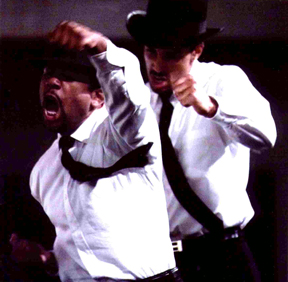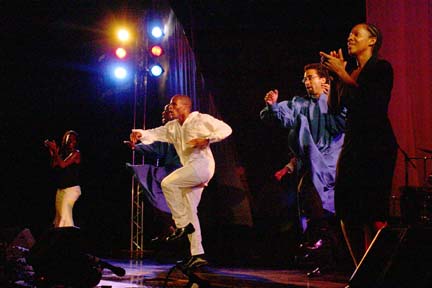American by any other name
Step Afrika!
Gala Theatre at the Tivoli
Washington, DC, USA
May 31, 2006
by George Jackson
copyright ©2006, George Jackson
 Stepping, as the Step Afrika! repertory proclaims loud and clear, is a high impact, high volume, intensely percussive form of dance. Its origins, according to company founder and executive director Brian Williams, were America’s Black college campuses of the early 1900s. To join fraternities or sororities the students at those schools had to learn reiterative rituals involving steps, claps, slaps and exclamations. Williams wants to keep these practices alive as a performing art. When his company draws on other rhythmic dance traditions — tap, flamenco, gumboot or Gullah — it isn’t for their more melodious, delicate or hushed facets. Force, speed and high decibels are what attract him and artistic director Jason Nious.
Stepping, as the Step Afrika! repertory proclaims loud and clear, is a high impact, high volume, intensely percussive form of dance. Its origins, according to company founder and executive director Brian Williams, were America’s Black college campuses of the early 1900s. To join fraternities or sororities the students at those schools had to learn reiterative rituals involving steps, claps, slaps and exclamations. Williams wants to keep these practices alive as a performing art. When his company draws on other rhythmic dance traditions — tap, flamenco, gumboot or Gullah — it isn’t for their more melodious, delicate or hushed facets. Force, speed and high decibels are what attract him and artistic director Jason Nious.
“The Pledge Scene / 1989” goes to the roots of stepping and is a gem of a number. I wondered about the date in the title for the piece had a 1940s, just post-World War 2 feel. A quartet of fraternity pledgelings is put through its paces by a Master Sergeant type while sorority sisters haze and heckle. The men are supposed to move, speak and breathe as a unit unless otherwise instructed and the stylization gets into a single image the jist of military drill, comedy routines and the Little Swans’ pas de quatre. Let alone, the guys are uninhibitedly individual and mutually supportive.
Church services, African silver mines, marching bands of the American South, and Zulu festivals are among the settings for other dances on the Step Afrika! program. The difference footwear can make is both subtle and obvious. Rubber boots worn by miners, not only for their work but also for the dances they do to pass time, give the same stomping step more squoosh — visual cushioning and a muffled sound — than do leather shoes.
 Another difference, the far reaching one between African American and African African aesthetics, shows in the work of this DC-based company. Americans tend to want instant gratification. They push a dance to climax as soon as possible, attaining top energy and top speed in no time flat, whereas Africans show the patience to build organically. Once they’ve reached peak, American versions of African dances have no place left to go and become repetitious. They also miss out on the pleasures of quiet movement and sustained development. Step Afrika! definitely is a made-in-the-USA group in this regard and perhaps ought to rename itself Stomp America! — even the program’s closing number, “Shhh!” , involves very audible shushes. I’d love to see the cast of propulsive, coordinated dancer-musicians — Mfon Akpan, Delonte Briggs, Khalid Freeman, Kirsten Ledford, Aisha Lord, Lesole Maine, Brian McCollum, Tamika McIntosh, Jason Nious, David Pleasant and Virginia Raye — express themselves and their heritage contemplatively on occasion.
Another difference, the far reaching one between African American and African African aesthetics, shows in the work of this DC-based company. Americans tend to want instant gratification. They push a dance to climax as soon as possible, attaining top energy and top speed in no time flat, whereas Africans show the patience to build organically. Once they’ve reached peak, American versions of African dances have no place left to go and become repetitious. They also miss out on the pleasures of quiet movement and sustained development. Step Afrika! definitely is a made-in-the-USA group in this regard and perhaps ought to rename itself Stomp America! — even the program’s closing number, “Shhh!” , involves very audible shushes. I’d love to see the cast of propulsive, coordinated dancer-musicians — Mfon Akpan, Delonte Briggs, Khalid Freeman, Kirsten Ledford, Aisha Lord, Lesole Maine, Brian McCollum, Tamika McIntosh, Jason Nious, David Pleasant and Virginia Raye — express themselves and their heritage contemplatively on occasion.
Photos (courtesy Step Afrika!):
First: the pledge scene.
Second: "Wade"
Volume 4, No. 22
June 5, 2006
copyright ©2006 George Jackson
www.danceviewtimes.com